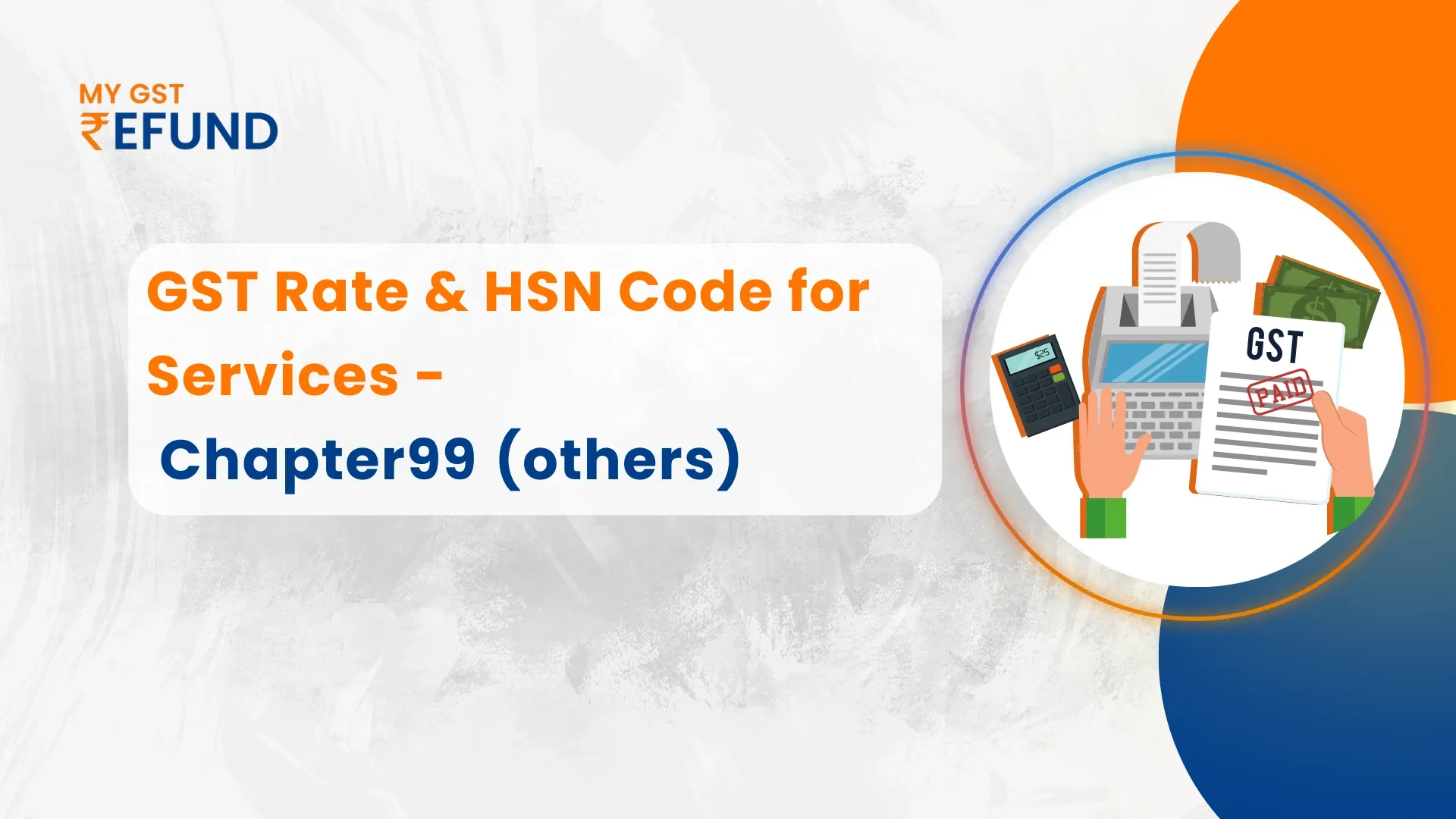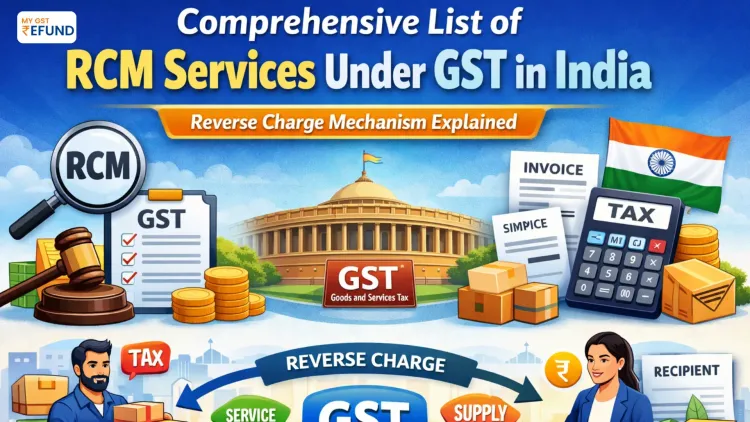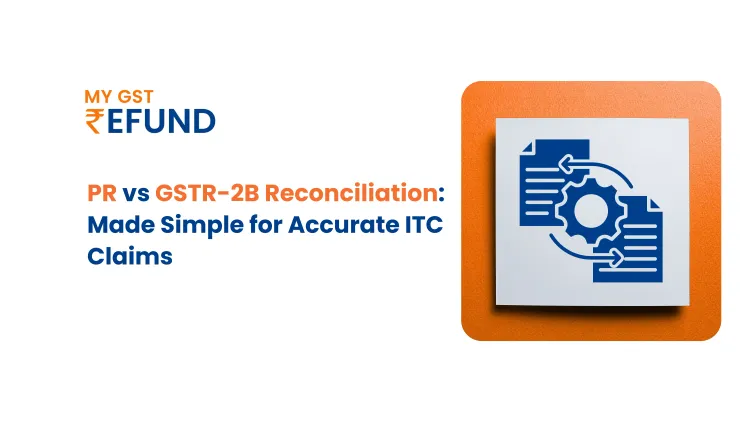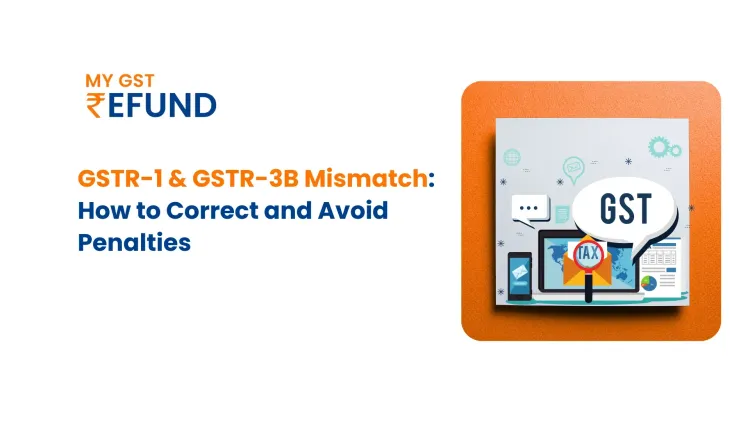GST Rates & SAC Codes for Chapter 99 Services in India
Published on: Wed Sep 17 2025
Bio (Reveal/Hide)

Understanding GST Rates & SAC Codes for Services in India
What is Chapter 99 in GST?
Chapter 99 is the dedicated section under GST that covers all services.
Goods are identified by HSN codes (Chapters 1 to 98), while services are identified by SAC codes under Chapter 99.
Every SAC code starts with “99”, followed by digits that define the service category and subcategory.
Under GST, every service is classified in Chapter 99 using the SAC instead of HSN. Choosing the right SAC is important because it sets the GST rate, identifies exemptions.
Why is SAC used instead of HSN for Services?
Goods use HSN codes for classification, but services are different. That’s why GST uses SAC (Services Accounting Code). Every service gets a unique SAC starting with “99,” which helps in applying the correct GST rate, claiming exemptions, and ensuring proper compliance.
Importance of Using the Correct SAC
- It ensures the right GST rate is applied.
- Correct SAC must appear on invoices.
- GSTR-1 and other returns require proper SAC reporting.
- The wrong SAC can block ITC claims.
- It provides a uniform system for GST compliance.
- The misuse of SAC can attract penalties up to ₹50,000 under the GST law.
Key Services and their GST Rates
Here are some services and their GST Rates:
- Logistics & Transportation Services (SAC 9965)
Depending on the kind of service and the route of transportation, GST for logistics and transportation services may vary. - GTA, or the Goods Transport Agency
Two GST options are available to GTAs, who manage the transportation of goods:
- 5% GST (Reverse Charge Mechanism – RCM):
- Here, the business hiring the GTA pays the GST instead of the transporter and cannot claim Input Tax Credit (ITC). Itis the default method for most GTA services. - 12% GST (Forward Charge Mechanism – FCM):
- The GTA charges GST directly to the client and can claim ITC. To use this method, GTAs must declare their choice annually.
Passenger Transport – SAC 9964
Moving people rather than goods falls under SAC 9964, and the GST rates change depending on the mode of travel:
Air Travel:
- Economy class → 5% GST
- Business class → 18% GST
Rail Travel:
- First class & AC coaches → 5% GST
- Sleeper (non-AC) & general class → Exempt from GST
- Metro services → Exempt from GST
Road Transport – SAC 9964 & 9966
Road transport covers both public passenger services and vehicle rental.
Public Transport:
- Non-AC buses, autos, non-AC taxis → Exempt (0% GST, no ITC)
- AC buses, AC taxis, and radio taxis are subject to 5% GST (no ITC)
- Uber and Ola, two app-based taxi services, are subject to 5% GST (no ITC).
– Use a cab service (with a driver) →
▸ 5% GST (no ITC) if a lower rate is chosen and 18% GST (with ITC) if full credit is claimed
Vehicle Rentals:
- Cars with driver & fuel →
▸ 5% GST (limited ITC) if opting for the concessional rate and 12% GST (full ITC) if opting for full credit
- Car rentals to companies (RCM) → Company pays 5% GST, unless the supplier charges 12% with ITC
- Trucks, buses, coaches →
▸ 18% GST (with full ITC) in most cases and 12% GST (with ITC) when fuel cost is included
Professional Services (SAC 9982–9983)
It covers legal, accounting, and IT-related work. This category includes some popular professional services, and the standard 18% GST is applicable in these cases as well.
Accounting & law: Legal and accounting services like consulting and auditing fall under 18% GST. Under RCM, businesses, not advocates, pay GST on legal services, which is an important compliance rule.
Management & Consultancy: Most consultancy services are still taxed at 18% GST, but from September 2025, certain types of management consulting have moved to a lower 5% rate.
IT & Software: Services like software development, IT consulting, support, and cloud solutions are uniformly taxed at 18% GST.
Real Estate & Construction Services (SAC 9954)
GST on construction and works contracts depends on the type of property and contract nature:
Residential Properties: 5% GST (no ITC) on apartment construction – covering both goods and services.
Commercial Properties: 18% GST (with ITC) on commercial buildings, including materials and labor.
Specialized Works Contracts: Contracts like government earthwork projects (75%+ earthwork), sub-contractor services, and offshore oil and gas exploration, are taxed at 18% with ITC (It is updated from 12%).
Key SAC Codes
- SAC 995411 covers the general construction services for residential buildings.
- SAC 995412 is used for the construction services related to commercial buildings.
Other Major Service Categories under GST (Chapter 99)
In this category, three key sectors affect both consumers and businesses, which are Financial & Banking, Hospitality, and Education. Each comes with specific SAC codes, GST rates, and exemptions.
Financial & Banking Services (SAC 9971)
Taxable Services (18% GST with ITC)
Every banking and financial charge, including account maintenance, as well as brokerage and third-party insurance services, is taxed at 18%. GST on third-party insurance of goods carriage was reduced from 12% with ITC to 5% without ITC.
Exempt Services: Interest on financial products (for private use, real estate, educational, etc.) is exempt from GST.
Services for Hospitality (SAC 9963)
Hotels and restaurants fall under SAC 9963, and GST varies based on room tariff or service type.
Hotel Accommodation:
Earlier, hotel rooms costing up to ₹7,500 per day attracted 12% with ITC. Now, this has been reduced to 5% without ITC.
Restaurants:
Normal standalone restaurants → 5% GST (no ITC)
Hotel Restaurants (those with room rent above ₹7,500/day) are taxed at 18% with ITC. So eating at posh hotels is in a higher GST slab, even if dining out at local restaurants is cheaper due to lower tax rates.
Educational Services (SAC 9992)
Under GST, educational services are either exempt or taxable. Education from the recognized institutions like schools, colleges, and universities is exempted. But the services like private coaching, competitive exam prep like IIT-JEE, NEET, UPSC, skill-based courses, and consultancy are taxable at 18% GST
The Reverse Charge System (RCM)
The government is typically paid by the service provider for the GST collected from the consumer. This is not the case under RCM, when the tax is paid directly by the service recipient.
Example:
- Goods Transport Agency (GTA): A factor or a company pays 5% GST under RCM, without ITC. The GTA now has the option to pay 18% GST with full ITC instead.
- Legal Services: The business entity pays 18% GST under RCM. Services to individuals are generally exempt.
- Renting of Motor Vehicles: RCM applies when a non-corporate person rents a passenger vehicle to a corporate entity, provided the supplier does not charge 12% GST and the cost of fuel is included in the consideration.
List of Exempted Services
Some essential services are exempt from GST to reduce the public's tax burden. These exemptions are often conditional. Here are some services that are GST-free:
- Healthcare Services: Most of medical services given by clinics, hospitals, and physicians are exempt. Cosmetic surgery might still have sales tax on it.
- Educational Services: The Services given by the recognized educational institutions, such as colleges, universities, and schools, are exempt. This includes related services like admissions and examinations.
- Transport Services: Public transport by metros, non-AC buses, and auto-rickshaws is exempt. Transporting essential goods like milk or food grains is also exempt.
- Government Services: The majority of services performed by government organizations are usually excluded from GST, especially those related to panchayat or municipality operations.
| Aspect | HSN (Goods) | SAC (Services) |
|---|---|---|
| Chapter / Prefix | Chapters 1-98 (includes) | Always starts with “99” code |
| Purpose | Classifies products / items (goods) | Classifies services code |
| Length (Digits) | Up to 8 digits in India (6 for international basic, plus 2 extra for finer classification) | 6 digits code |
| Issuing / Governing Body | Developed by World Customs Organization (WCO); adapted by Indian govt for GST / Customs / Excise | Issued/maintained under CBIC (Central Board of Indirect Taxes & Customs) / GST authorities body |
| Global / Local Use | Used globally (for goods); Indian version extends HSN for detailed classification under GST, imports & exports etc. | Primarily used within India for GST classification of services. |
| Invoice Requirement | Mandatory for goods in GST invoices above certain turnover thresholds, varying digit lengths depending on turnover and requirement. | Mandatory for all taxable services on invoices (i.e. every service-invoice must include appropriate SAC code. |
| Example | HSN 3004 → Medicines / 62011210 → Raincoat | SAC 9983 → IT Services / 998314 → IT design etc. |
GST Consultants in Gurgaon - Trusted Experts Near You
MyGSTRefund is the No. 1 India’s first fully automated GST refund platform.
With smart tools like the HSN & SAC Finder and the Refund Calculator it helps exporters and MSMEs file faster, avoid errors, and unlock refunds without delays.
Tools and features include:
• A refund calculator to estimate what you’re eligible for.
• GSTIN status validator, HSN/SAC code finder
Importance of HSN and SAC Codes for Businesses
HSN and SAC codes are important for GST compliance as they ensure accurate tax rates, prevent over/undercharging, and will also reduce the errors.
They are mandatory in GST returns (like GSTR-1) and on invoices. It also provides clarity for businesses and customers.
Who Benefits Most
- Exporters need export refunds.
- Businesses are facing inverted duty credit issues.
- Companies that want fast, low-hassle GST compliance and refund claims, especially in Delhi/NCR.
How does the HSN validator help an exporter find the HSN code / avoid blocked credit?
Step 1: Open the MyGST Refund Dashboard
Log in to your MyGSTRefund account. On the left sidebar, go to the Tools section and click on HSN & SAC Finder.
Step 2: Search HSN/SAC Code Finder
- Type the name of your product or service.
- Select the option (HSN for goods or SAC for services).
- The tool will instantly display the code, description, and applicable GST rate.
- You can also check the ITC status if it is blocked or unblocked.
This will ensure you to apply the correct rate, avoid errors in invoices & returns, and stay GST-compliant.
Step 3: Use the Refund Calculator
- Choose “Refund Calculator” from the calculator section and then:
Enter your basic details (name, email, mobile). - Click Calculate Now.
Instantly get an estimated refund amount based on your inputs.
With accurate HSN/SAC codes and instant refund estimates, exporters can:
- Avoid blocked ITC
- File GST returns faster
- Receive refunds without unnecessary delays
If you need expert help, then our Gurgaon-based GST consultants specialize in refunds, HSN/SAC categorization, and GST filings. Contact us today and simplify your compliance journey.
Frequently Asked Questions
Q1: Is SAC mandatory for all services?
Yes, every taxable service must have a SAC code. It ensures correct GST calculation and compliance.
Q2: What is the GST rate for professional services?
Most professional services like legal, accounting, and IT are taxed at 18% GST.
Q3: How is GST calculated for services?
GST = Service value × GST rate.
For example, ₹10,000 for services × 18% GST equals ₹1,800.
Q4: What are the GST rates on IT services?
IT services like software, IT consulting, and cloud services are usually 18% GST.
Q5: Are all services under Chapter 99 taxable?
No. Some services are exempt, like education by recognized institutions, healthcare, and certain public transport.
Related Posts






